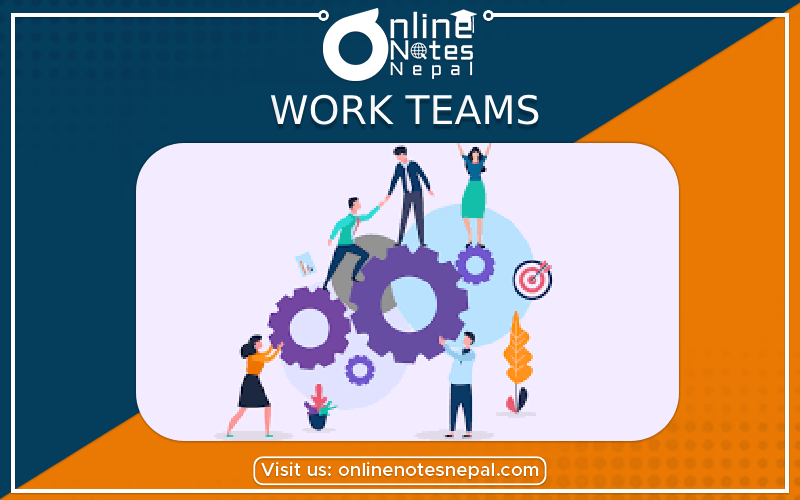Published by: Dikshya
Published date: 27 Jul 2023

A work team is a group of individuals who come together in a workplace to collaborate, share expertise, and work towards achieving common goals and objectives. These teams can be small or large and are typically composed of employees with complementary skills and knowledge. The purpose of forming work teams is to bring out the collective strengths and abilities of its members to enhance productivity, problem-solving, and overall performance in the organization.
Key characteristics of work teams are:
1. Collaboration: Work teams work together collaboratively, combining their efforts and skills to achieve common goals.
2. Interdependence: Team members rely on each other's contributions and support to accomplish tasks successfully.
3. Shared Goals: Work teams have shared objectives aligned with the overall mission and vision of the organization.
4. Clear Roles: Each team member has a defined role and responsibilities within the team.
5. Effective Communication: Open and clear communication is essential to ensure smooth coordination and information exchange among team members.
6. Mutual Accountability: Team members are collectively responsible for the team's performance and outcomes.
7. Supportive Environment: A positive and supportive team environment fosters trust, creativity, and innovation.
8. Problem-Solving: Work teams often engage in joint problem-solving, allowing for diverse perspectives and solutions.
Work teams can be an integral part of an organization's structure and contribute significantly to its success. When managed effectively, work teams can enhance employee engagement, job satisfaction, and overall organizational performance.
Work teams can take on various forms, including functional teams, cross-functional teams, project teams, virtual teams, self-directed teams, and more. The specific type of work team depends on the nature of the tasks or projects they are assigned to and the organization's structure and objectives.
a. Functional Teams: Composed of employees with similar skills and expertise, focusing on a specific function within an organization, such as marketing, finance, or HR.
b. Cross-Functional Teams: Consist of members from different departments or functions working together on a specific project or task, pooling their diverse expertise.
c. Virtual Teams: Geographically dispersed members collaborate using communication technologies, allowing remote work and global collaboration.
d. Self-Directed Teams: Empowered to make decisions about how they will complete their tasks, with minimal supervision.
e. Problem-Solving Teams: Formed to address specific issues or challenges and come up with solutions.
f. Project Teams: Created to work on temporary projects, typically with a set end date.
a. Clear Goals: Well-defined objectives and expectations for the team's performance.
b. Role Clarity: Each team member understands their responsibilities and how they contribute to the team's success.
c. Effective Communication: Open and clear communication among team members to share information and ideas.
d. Trust and Cohesion: Strong bonds and mutual trust among team members.
e. Diversity and Skills: Diversity in skills, backgrounds, and perspectives to enhance problem-solving and creativity.
f. Leadership and Support: Effective leadership to guide the team and provide necessary resources and support.
g. Feedback and Recognition: Regular feedback and acknowledgment of team members' efforts and achievements.
h. Conflict Resolution: A constructive approach to handling conflicts and disagreements.
a. Selecting the Right Members: Careful consideration of skills, expertise, and personality traits that align with the team's objectives.
b. Establishing Clear Goals: Clearly defining the team's purpose, objectives, and measurable outcomes.
c. Developing Trust and Cohesion: Team-building exercises and open communication to foster trust and a positive team dynamic.
d. Providing Resources: Ensuring the team has access to the necessary tools, information, and support.
e. Training and Development: Offering training to enhance skills and promote continuous learning.
f. Empowering Decision Making: Granting autonomy to the team in making decisions related to their tasks.
g. Effective Leadership: Appointing a capable leader who can guide, inspire, and support the team.
a. Brainstorming: Generating a large number of ideas without judgment to encourage creativity.
b. Consensus Decision Making: Seeking agreement from all team members before making a decision.
c. Majority Vote: Making decisions based on a simple majority vote.
d. Authority Rule: A designated leader or authority figure makes the final decision.
e. Nominal Group Technique: Individuals generate ideas independently, and then they are discussed and ranked as a group.
a. Conflict Management: Dealing with interpersonal conflicts and disagreements that can arise within the team.
b. Communication Challenges: Ensuring effective communication in virtual or cross-cultural teams.
c. Coordination Issues: Ensuring smooth coordination among team members, especially in larger teams.
d. Team Member Disengagement: Addressing issues of low motivation or disinterest among team members.
e. Decision-Making Delays: Overcoming indecisiveness or delays in the decision-making process.
f. Uneven Workload: Ensuring fair distribution of tasks and responsibilities among team members.
g. Lack of Leadership Support: When team leaders fail to provide necessary guidance and support.
h. Resistance to Change: Managing resistance when implementing new processes or changes.
Note: Building and managing effective work teams require ongoing effort, adaptation, and continuous improvement. Successful teams are characterized by strong collaboration, clear communication, and a shared commitment to achieving their goals.